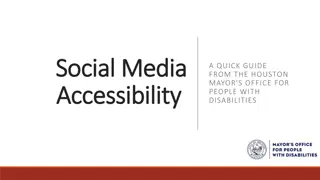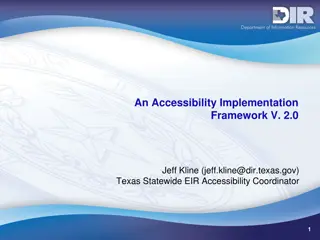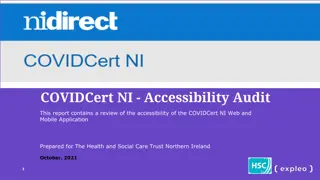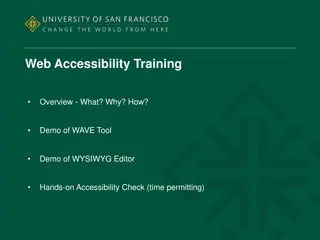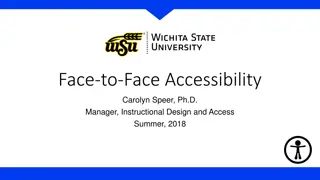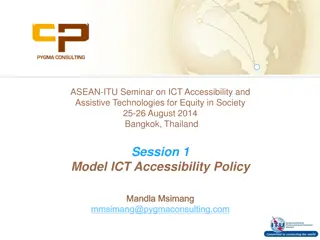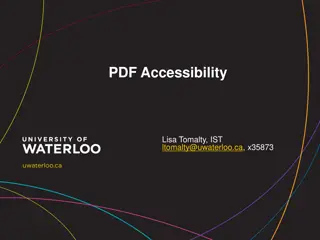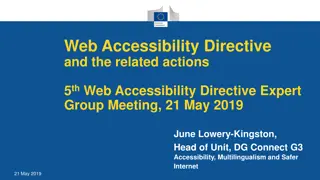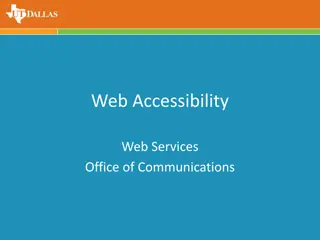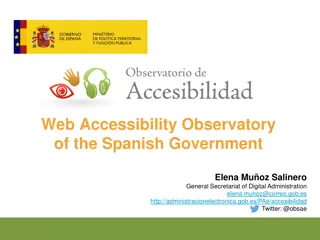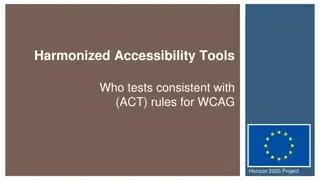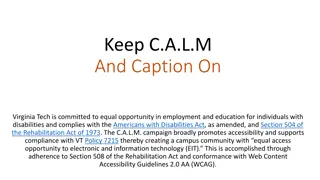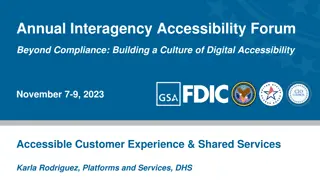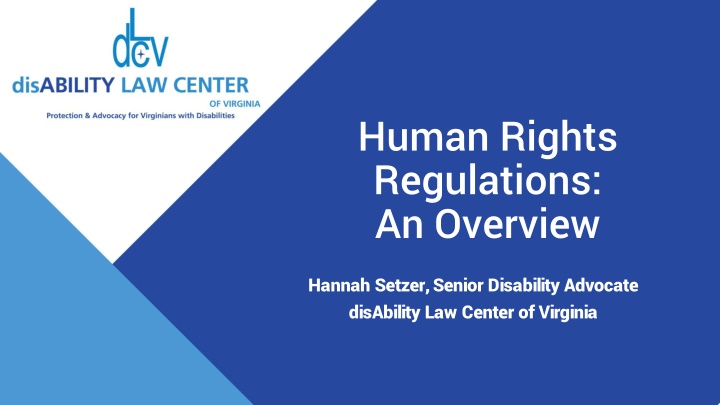
Understanding Human Rights Regulations in Virginia
Explore the Human Rights Regulations in Virginia, formerly known as The Regulations to Assure the Rights of Individuals Receiving Services from Providers. These regulations ensure the protection of legal and human rights for individuals receiving services through the Department of Behavioral Health and Developmental Services, covering aspects like authority, application, and assurance of rights.
Download Presentation

Please find below an Image/Link to download the presentation.
The content on the website is provided AS IS for your information and personal use only. It may not be sold, licensed, or shared on other websites without obtaining consent from the author. If you encounter any issues during the download, it is possible that the publisher has removed the file from their server.
You are allowed to download the files provided on this website for personal or commercial use, subject to the condition that they are used lawfully. All files are the property of their respective owners.
The content on the website is provided AS IS for your information and personal use only. It may not be sold, licensed, or shared on other websites without obtaining consent from the author.
E N D
Presentation Transcript
Human Rights Regulations: An Overview Hannah Setzer, Senior Disability Advocate disAbility Law Center of Virginia
What are the Human Rights Regulations? Authority & Applicability Assurance of Rights Provider Responsibilities Office of Human Rights Definitions Explanation of Individual Rights Substitute Decision-Making Variances Human Rights Complaint Process The Complaint LHRC Appeal SHRC Appeal Resources Conclusion Contents
What are the Human Rights Regulations? These are formerly known as The Regulations to Assure the Rights of Individuals Receiving Services from Providers Licensed, Funded, or Operated By The Department of Behavioral Health and Developmental Services It is the legislative mandate under the Code of Virginia to assure and protect the legal and human rights of all Individuals receiving services through DBHDS
Authority & Application The Code of Virginia (2VAC35-115-10) authorizes these regulations to further define and protect the rights of individuals receiving services from providers of mental health, developmental, or substance abuse services in Virginia They require providers of services to take specific actions to protect the rights of each individual They establish remedies when rights are violated or are in dispute Unless otherwise provided by law, this chapter applies to all individuals who are receiving services from a public or private provider of services operated, licensed, or funded by the Department of Behavioral Health and Developmental Services except those operated by the Department of Corrections
Assurance of Rights The Human Rights Regulations assure the rights as established in the Virginia Code 37.2-400 Each Individual receiving services is assured certain undeniable rights: Protection to exercise legal, civil, and human rights Respect for basic human dignity Sound, therapeutic practice An Individual retains all legal rights: Property Vote Marry, divorce, separate Maintain professional license
Assurance of Rights: Provider Responsibilities Providers must: Display the rights in the manner best understood, including: in areas most likely noticed documenting the Regional Advocate s contact info on the poster Notify individuals about their rights and how to file a complaint Notification must be: in writing at the time services begin and annually thereafter made to the authorized representative (AR) if applicable Obtain individual and AR signature on the rights notification making sure to maintain the document in the services record Providers must also: Provide a copy of the HRR to anyone who asks Display and give information about dLCV
Assurance of Rights: Provider Responsibilities Providers must: Comply with all state laws and regulations governing the reporting of abuse and neglect Submit to the human rights advocate for review and comment proposed policies, procedures, or practices that may affect individual human rights; Cooperate with the human rights advocate and the LHRC to investigate and correct conditions or practices interfering with the free exercise of individuals' human rights Providers shall require their employees to: Become familiar with this chapter, comply with it in all respects, and help individuals understand and assert their rights; Protect individuals from any form of abuse, neglect, or exploitation by: Not abusing, neglecting, or exploiting any individual; Using the minimum force necessary to restrain an individual; Not permitting or condoning anyone else abusing, neglecting, or exploiting any individual; and Reporting all suspected abuse, neglect, or exploitation to the director; and Cooperate with any investigation, meeting, hearing, or appeal, including giving statements or sworn testimony.
Assurance of Rights: Office of Human Rights The mission of the Office of Human Rights is to monitor compliance with the Human Rights Regulations, oversee the DBHDS Human Rights complaint resolution program and advocate for individual human rights Human rights advocates shall: Represent any individual making a complaint or, upon request, consult with and help any other representative the individual chooses; Provide training to individuals, family members, and providers on this chapter; Investigate and try to prevent or correct any alleged rights violation by interviewing, mediating, negotiating, advising, or consulting with providers and their respective governing bodies, directors, and employees; Provide orientation, training, and technical assistance to the Local Human Rights Committees (LHRCs) Investigate and examine all conditions or practices that may interfere with the free exercise of individuals' rights.
Definitions "Abuse" = any act or failure to act by an employee or other person responsible for the care of an individual in a facility or program operated, licensed, or funded by the department, excluding those operated by the Department of Corrections, that was performed or was failed to be performed knowingly, recklessly, or intentionally, and that caused or might have caused physical or psychological harm, injury, or death to a person receiving care or treatment for mental illness, intellectual disability, or substance abuse. Examples of abuse include acts such as: Rape, sexual assault, or other criminal sexual behavior; Assault or battery; Use of language that demeans, threatens, intimidates, or humiliates the person; Misuse or misappropriation of the person's assets, goods, or property; Use of excessive force when placing a person in physical or mechanical restraint; Use of physical or mechanical restraints on a person that is not in compliance with federal and state laws, regulations, and policies; professionally accepted standards of practice; or the person's individualized services plan; and Use of more restrictive or intensive services or denial of services to punish the person or that is not consistent with his individualized services plan
Definitions "Exploitation" = the misuse or misappropriation of the individual's assets, goods, or property Exploitation is a type of abuse Exploitation also includes the use of a position of authority to extract personal gain from an individual. "Neglect" = failure by a person, program, or facility operated, licensed, or funded by the department, excluding those operated by the Department of Corrections, responsible for providing services to do so including nourishment, treatment, care, goods, or services necessary to the health, safety, or welfare of an individual receiving care or treatment for mental illness, intellectual disability, or substance abuse
Explanation of Individual Rights Dignity Services Participation in decision making and consent Confidentiality Access to and amendment of services records Restrictions on freedoms of everyday life Behavioral treatment plans Use of seclusion, restraint, and time out Work Research
Explanation of Individual Rights: Dignity Dignity is the cornerstone of the Human Rights Regulations Respect, Safety, & Welfare Health and safety is primary when considering all other rights Individuals must be protected from harm, including abuse, neglect, and exploitation Each individual has a right to exercise his legal, civil, and human rights, including constitutional rights, statutory rights, and the rights contained in this chapter Each individual has a right to have services that he receives respond to his needs and preferences and be person-centered Each individual also has the right to be protected, respected, and supported in exercising these rights
Explanation of Individual Rights: Dignity Other rights include Use of preferred or legal name Have opportunities to communicate in private with lawyers, judges, oversight agencies, and others Be provided with general information about program services, policies, and rules in writing and in the manner, format and language easily understood by the individual. Practice a religion and participate in religious services Communicate privately with any person by mail and/or by telephone Have or refuse visitors In services provided in residential and inpatient settings, each individual has the right to: Have sufficient and suitable clothing for his exclusive use. Receive nutritionally adequate, varied, and appetizing meals that are prepared and served under sanitary conditions, are served at appropriate times and temperatures, and are consistent with any individualized diet program Live in a humane, safe, sanitary environment that gives each individual
Explanation of Individual Rights: Services Each individual receiving services shall receive those services according to law and sound therapeutic practice Providers shall ensure that all services, including medical services and treatment, are at all times delivered in accordance with sound therapeutic practice Providers may deny or limit an individual's access to services if sound therapeutic practice requires limiting the service to individuals of the same sex or similar age, disability, or legal status Providers must implement policies & procedures: That prohibit and regularly monitor for discrimination. That address emergencies. Providers must designate specific staff to: screen, assess individuals at admission and throughout service provision prepare, implement, and modify ISP based on ongoing need prepare, implement discharge plan review every use of seclusion, restraint
Explanation of Individual Rights: Services Providers must 0nly provide services based solely on an individual s specifically tailored ISP Providers must: Write the ISP and discharge plan in clear, understandable language. Ensure all services on the ISP and the discharge plan are integrated. Ensure that entries in an individual's services record are authentic, accurate, complete, timely, and pertinent, at all times. Providers may involve family members in services and discharge planning with the individual's or the individual's authorized representative's authorization When the individual or his authorized representative requests such involvement, the provider shall take all reasonable steps to do so. In the case of services to minors, the parent or guardian or other person authorized to consent to treatment (pursuant to 54.1-2969 A of the Code of Virginia) shall be involved in service and discharge planning.
Explanation of Individual Rights: Participation in Decision-Making & Consent Individuals have the right to: Consent or not consent to receive or participate in services. The ISP and discharge plan shall incorporate the individual's preferences consistent with his condition and need for service and the provider's ability to address them; The individual's services record shall include evidence that the individual has participated in the development of his ISP and discharge plan Give or not give informed consent to receive or participate in certain treatment or services and to participate in human research Informed consent is always required for surgical procedures, electroconvulsive treatment, or use of psychotropic medications Have an Authorized Representative (AR) make decisions on their behalf If the AR objects or refuses to consent to a specific proposed treatment or service, the provider shall not institute the proposed treatment except in an emergency Be accompanied by a person or persons whom the individual trusts to support and represent him when he participates in services planning, assessments, evaluations, and discharge planning Except during forensic evaluations Ask to be admitted or discharged from any service at any time
Explanation of Individual Rights: Participation in Decision-Making & Consent Providers duties: Shall ask the individual s preferences regarding in decisions regarding all aspects of their services and shall honor those preferences to the extent possible Respect, protect, and help develop each individual s ability to participate meaningfully in decisions regarding all aspects of their services Providers shall give each individual the opportunity and any help he needs to participate meaningfully in the preparation of his services plan, discharge plan, and all other aspects of services Obtain permission prior to any treatment Providers may provide treatment in accordance with a court order or in accordance with other provisions of law that authorize such treatment or services Emergency treatment may be initiated without permission Make sure to have policies & procedures in place Immediately contact the AR Document all aspects of the emergency in the services record within 24 hrs
Explanation of Individual Rights: Confidentiality Each individual is entitled to have all identifying information that a provider maintains or knows about him remain confidential Providers must: Maintain confidentiality of any identifying information Exceptions exist Emergencies Providers or health plans Court proceedings or legal counsel P&A and other oversight agencies Also see Confidentiality of Alcohol and Drug Abuse Patient Records Obtain and document the individual s and/or AR s authorization prior to disclosure of confidential information
Explanation of Individual Rights: Access & Amendment of Services Record Individuals and their AR have the right to: See, read, and get a copy of his own services record Let certain other people see, read, or get a copy of his own services record Challenge, request to amend, or receive an explanation of anything in his services record Let anyone who sees his record, regardless of whether amendments to the record have been made, know that the individual has tried to amend the record or explain his position and what happened as a result
Explanation of Individual Rights: Access & Amendment of Services Record Minors must have parent or legal guardian s permission to access service record, except for: Sexually transmitted or reportable contagious diseases Family planning or pregnancy Substance use treatment Mental/emotional disturbance treatment Inpatient psychiatric hospitalization if 14+ and consented to admission Parents do not need permission to access their minor s records, except when: Parental rights terminated Court order prevents access Physician/clinical psychologist determine such access is contraindicated
Explanation of Individual Rights: Access & Amendment of Services Record Providers shall tell each individual and AR how to access and request amendment of the services record Providers shall permit each individual to see his services record when requested and to request amendments Access may be denied or limited Contraindications as determined by treating physician or clinical psychologist If access is denied in whole or in part, the provider shall give the individual or AR a written statement that explains the basis for the denial, the individual's review rights, and how the individual may file a complaint The Regulations also dictate a process on how an individual can request a review of the access denial Providers shall give individuals any help they may need to read and understand their services record and request amendments to it without charge Any challenges or amendment requests an individual makes must be investigated and a written report added to the record
Explanation of Individual Rights: Restrictions on Freedoms of Everyday Life Individuals are entitled to freedoms consistent with needs for: Services Protection of self Protection of others Uninterrupted services Services must be delivered in the least restrictive setting Freedoms of everyday life include the freedom to: Move within the service setting, its grounds, and community Communicate, associate, privately meet with anyone Have and spend personal money See, hear, or receive TV, radio, books, newspapers Keep and use personal clothing, personal items Use recreational facilities, enjoy the outdoors Make purchases in canteens, vending machines, stores selling a basic selection of food and clothing
Explanation of Individual Rights: Restrictions on Freedoms of Everyday Life Providers shall encourage each individual's participation in normal activities and support each individual's freedoms Providers shall not limit or restrict any individual's freedom more than is needed to achieve a therapeutic benefit, maintain a safe and orderly environment, or intervene in an emergency Providers shall not impose any restriction on an individual unless the restriction is justified and carried out according to the Regulations or otherwise required by law
Explanation of Individual Rights: Restrictions on Freedoms of Everyday Life Restrictions must be justified and meet the following conditions: Pre-assessment & documentation by a qualified professional Possible alternatives are explored and documented Restriction must be necessary for effective treatment or to protect themselves/others Reason for the restriction documented Restriction is explained and written notice is provided to the individual Written notice includes the reason for the restriction, criteria for removal, and right to fair review Restriction is regularly reviewed and discontinued when removal criteria is met Restrictions which are court ordered, or required by law, must be documented in the services record.
Explanation of Individual Rights: Restrictions on Freedoms of Everyday Living Use of restrictions must be reviewed and approved by the LHRC when: the restriction lasts longer than 7 days the restriction is imposed three or more times during a 30-day time period The LHRC will provide recommendations for appropriate implementation of restrictions, according to the Regulations.
Explanation of Individual Rights: Restrictions on Freedoms of Everyday Living Providers may develop and enforce written program rules as needed to maintain a safe and orderly environment Cannot contradict Regulations Cannot contradict individual s ISP Providers shall, in the development of these program rules: Get as many suggestions as possible from all individuals who are expected to obey the rules; Apply these rules in the same way to each individual; Give the rules to and review them with each individual and his authorized representative in a way that the individual can understand them, including explaining possible consequences for violating them; Post the rules in summary form in all areas to which individuals and their families have regular access; Submit the rules to the LHRC for review and approval upon request of the advocate or LHRC Prohibit individuals from disciplining one another
Explanation of Individual Rights: Behavioral Treatment Plans A behavioral treatment plan (BTP) is used to improve participation in normal activities reduce challenging behaviors alleviate symptoms maintain a safe and orderly environment A BTP may use restrictions such as restraint or time out, but the plan must: Be individualized Address maladaptive behaviors that pose immediate danger Document the lack of success or probable success of less restrictive procedures attempted or considered Have been developed after a systematic assessment by a licensed professional or licensed behavior analyst Be reviewed by an independent review committee before implementing Be mindful to consider the behavior management program/protocol (e.g., TOVA, MANDT, etc.)
Explanation of Individual Rights: Use of Seclusion & Restraint "Restraint" = the use of a mechanical device, medication, physical intervention, or hands-on hold to prevent an individual from moving his body to engage in a behavior that places him or others at imminent risk Physical: use of a physical intervention or hands-on hold to prevent an individual from moving their body (ex. TOVA) Mechanical: use of a mechanical device that cannot be removed by the individual (ex. emergency restraint chair, 4- point and 2-point restraints) Pharmacological: the use of a medication that is administered involuntarily and the administered medication is not a standard treatment.
Explanation of Individual Rights: Use of Seclusion & Restraint continued Restraints for behavioral purposes" = using a physical hold, medication, or a mechanical device to control behavior or involuntarily restrict the freedom of movement of an individual There is an emergency "Emergency" means a situation that requires a person to take immediate action to avoid harm, injury, or death to an individual or to others Nonphysical interventions are not viable, and; Safety issues require an immediate response. "Seclusion" = the involuntary placement of an individual alone in an area secured by a door that is locked or held shut by a staff person, by physically blocking the door, or by any other physical or verbal means, so that the individual cannot leave it.
Explanation of Individual Rights: Use of Seclusion & Restraint There should be no unnecessary use of seclusion, restraint, or time out Community providers may not use seclusion, unless they are licensed as a children's residential facility or inpatient hospital, and only then, if they have approved polices Mechanical supports for position, alignment, balance, and protective equipment are not considered restraints, if used voluntarily
Explanation of Individual Rights: Use of Seclusion & Restraint Providers shall: meet with the individual and AR upon admission to the service to discuss and document preferred interventions document all known contraindications to the use of seclusion, time out, or any form of physical or mechanical restraint Providers shall not: Use seclusion, restraint, or time out as a punishment or reprisal or for the convenience of staff Use seclusion or restraint solely because criminal charges are pending against the individual Use a restraint that places the individual's body in a prone (face down) position Use seclusion or restraint for unless other less restrictive techniques have been considered and documentation is placed in the ISP that these less restrictive techniques did not or would not succeed or that no less restrictive measure was possible
Explanation of Individual Rights: Use of Seclusion & Restraint Providers that use seclusion, restraint, or time out shall develop written policies and procedures that include at least the following requirements: Individuals shall be given the opportunity for motion and exercise, to eat at normal meal times and take fluids, to use the restroom, and to bathe as needed Trained, qualified staff shall monitor the individual's medical and mental condition continuously while the restriction is being used Each use of seclusion, restraint, or time out shall end immediately when criteria for removal are met. Incidents of seclusion and restraint, including the rationale for and the type and duration of the restraint, shall be reported to DBHDS
Explanation of Individual Rights: Work & Research Work Individuals have a right to work or not work Labor cannot be a requirement for services Employment consideration must be equal Cost of services cannot be deducted from wages Research Individuals have a choice whether to participate Individual or AR must give informed consent Institutional review board (IRB) approval must be obtained Follow federal guidelines
Supported Decision Making Authorized Representatives If there is a lack of capacity, consent/authorization must be obtained from: an attorney-in-fact a health care agent a legal guardian A family member can be chosen as an authorized representative The individual s preference must be considered If no qualified family member, a next friend can be appointed Have to prove supportive relationship & get LHRC approval Capacity Evaluations If capacity is in doubt, providers must obtain an evaluation even if an AR is requested and individual agrees to treatment The individual and their family have the right to object and seek an independent evaluation The provider has to wait to take action that requires consent until capacity is determined
Variances Variances to these regulations shall be requested and approved only when: the provider has tried to implement the relevant requirement without a variance can provide objective, documented information that continued operation without a variance is not feasible or will prevent the delivery of effective and supportive services The application for variance shall also describe time limits and other conditions for duration and the circumstances that will end the applicability of the variance LHRC and SHRC review variances Allows for anyone potentially affected by variance to speak Can modify, approve, or disapprove If approved, the policies and procedures governing the variance shall specify that at no time can a variance approved for one individual be extended to general applicability
Human Rights Complaint Process: The Complaint Individuals have the right to: Make a complaint Have a timely review/investigation of the complaint Have someone file a complaint on his behalf; Use these and other complaint procedures and make a complaint under any applicable law, including to the P&A agency Once the individual has made the complaint, the individual shall: Be contacted by the director or the director's designee regarding the complaint within 24 hours; Have access to a human rights advocate for assistance with the complaint; Be protected from retaliation and harm; Receive a report with the director's decision and action plan within 10 working days; and Be notified in writing of his right to and the process for appealing the director's decision and action plan to the LHRC.
Human Rights Complaint Process: The Complaint Provider responsibilities upon receipt of complaint Notify DBHDS of the complaint no later than next business day Must follow reporting requirements (CHRIS system) Contact individual within first 24 hours regarding complaint Initiate an impartial investigation into complaint no later than next business day Protect individual from retaliation and harm Assist the individual in understanding the human rights complaint process, resolution policies and procedures, and confidentiality Ensure that all communications to the individual are in the manner, format, and language most easily understood by the individual; Report the director's decision and action plan within 10 working days to the individual, AR, if applicable, and human rights advocate.
Human Rights Complaint Process: The Complaint There are additional requirements for complaints involving abuse, neglect, or exploitation The director shall take immediate steps to protect the individual Any inappropriate instance of seclusion or restraint or any instances that results in injury shall be reported to the AR and to DBHDS The director shall notify DBHDS and the AR within 24 hours of the receipt of the allegation. The investigation must be conducted by someone trained to do so and who is not involved with the allegation The investigator shall provide a written investigation report to director and to OHR within 10 working days (unless extension granted) The director shall decide, based on investigation report and any other available information, whether the abuse, neglect, or exploitation occurred Use the preponderance of evidence standard = more likely than not The director shall submit the final decision and action plan to the individual, AR, and human rights advocate within 10 working days If director has reason to suspect that the alleged act is a crime and that it occurred on the program premises, the director or designee shall immediately contact the appropriate law- enforcement authorities
Human Rights Complaint Process: LHRC Appeal Individual and/or AR have the right to appeal the director s decision The human rights advocate or any person the individual chooses may help the individual in filing the petition The individual and chosen representative can still request the advocate s assistance The petition, which must be in writing, must be filed within 10 days of the director s final decision Submitted to the LHRC chairperson In practice, the human rights advocate
Human Rights Complaint Process: LHRC Appeal The LHRC holds a hearing within 20 working days of receiving the petition The parties shall have at least five working days' notice of the hearing. The director or his designee shall attend the hearing. The individual, AR, or chosen representative making the complaint shall attend the hearing. How the hearing works The hearing is an informal process and, as such, the rules of evidence are not applicable. At the hearing, the parties and chosen representatives and designees have the right to present witnesses and other evidence and the opportunity to be heard. The hearing shall be conducted in a nonadversarial manner Cannot direct questions to other party; all questions are directed to LHRC Each party shall be provided the opportunity to present its facts. The LHRC shall ask questions, as appropriate, to each party.
Human Rights Complaint Process: LHRC Appeal Within 10 working days, the LHRC shall give its written findings of fact and recommendations to the parties and their representatives Within five working days of receiving the LHRC's findings and recommendations: The director shall give the individual, the individual's chosen representative, the human rights advocate, the governing body, and the LHRC a written action plan he intends to implement to respond to the LHRC's findings and recommendations The director shall provide written notice to the individual about the timeframe for the individual's response and a statement that if the individual does not respond, then the complaint will be closed The individual, their chosen representative, the human rights advocate, or the LHRC may object to the action plan within five working days If an objection to the action plan is made and the director does not resolve the objection within two working days following its receipt by the director, the individual may appeal to the SHRC
Human Rights Complaint Process: SHRC Appeal Any party may appeal to the SHRC if they disagree with any of the following: An LHRC's final findings of fact, conclusions, and recommendations following a hearing A director's final action plan following an LHRC hearing An LHRC's final decision regarding the capacity of an individua An LHRC's final decision concerning whether consent or authorization is needed for the director to take a certain action Appeals shall be filed in writing with the SHRC by a party within 10 working days of receipt of the final decision or action plan. Like the LHRC appeal, the human rights advocate or any other person may help the individual in filing the appeal
Human Rights Complaint Process: SHRC Appeal The SHRC shall hear the appeal at its next scheduled meeting after the chairperson receives the appeal The SHRC shall give the parties at least 10 working days' notice The following rules govern appeal hearings: The SHRC shall not hear any new evidence and is bound by the LHRC's findings of fact Unless they determine those findings of fact are clearly wrong or that the LHRC hearing procedures were inadequate The SHRC shall limit its review to whether the facts establish a violation and a determination of whether the LHRC's recommendations or the action plan adequately address the alleged violation All parties and their representatives shall have the opportunity to present their positions and answer questions the SHRC may have Within 20 working days after the SHRC appeal hearing, the SHRC shall submit a decision containing its findings of fact and its conclusions and recommendations Within 10 working days after receiving the SHRC's decision For state facilities: the commissioner create corrective action plan For other providers: the director creates corrective action plan
CONNECT WITH US ADDRESS 1512 Willow Lawn Drive Suite 100 Richmond, VA 23230 PHONE 1-800-552-3962 (toll-free) | 804-225-2042 Spotify icon Twitter icon Instagram icon Facebook icon WEBSITE dLCV.org dlcv.org/podcast @disAbilityLawVA @disAbilityLawVA facebook.com/ disAbilityLawVA




